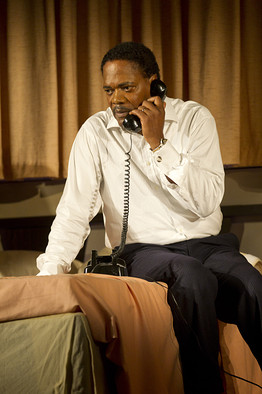In today’s Wall Street Journal drama column I review two New York premieres, The Mountaintop and We Live Here. Here’s an excerpt.
* * *
Most Americans regard Martin Luther King, Jr. as something of a saint, and don’t care to suppose that he might actually have been a great but flawed man. When it became known that Jackie Kennedy, of all people, called him “phony” and “tricky” in an interview recorded in 1964 but not released until last month, the result was a mass fit of cognitive dissonance, followed by…silence. Nobody likes to talk about his extramarital philandering, which was amply documented in FBI reports shared with Mrs. Kennedy by her gossipy husband, himself a serial adulterer. Yet Americans long ago faced the facts about John Kennedy and (mostly) continue to admire him. What makes Dr. King different? Why are we so reluctant to see him as he was?
 For the first few minutes of “The Mountaintop,” the new play about the last hours of Dr. King’s life that opened last night on Broadway, it appears as though Katori Hall is prepared to portray the civil-rights leader (played by Samuel L. Jackson) not as a wax dummy but as a creature of flesh, blood and smelly feet who smokes and drinks on the sly and views himself with the wry detachment of a man who knows better than to take his own reputation too seriously. The arrival on the scene of a sassy maid (Angela Bassett) bodes no less well, for it is clear that “Preacher King,” as she calls him, would very much like to coax her into bed. At that point “The Mountaintop” turns into a Tracy-Hepburn comedy rewritten for the chitlin circuit, but the laughs are honest ones and you don’t feel cheated–yet. Alas, Ms. Hall pulls an even bigger switch halfway through the play, about which critical etiquette precludes me from saying more than that she appears to have seen “Here Comes Mr. Jordan” more than once….
For the first few minutes of “The Mountaintop,” the new play about the last hours of Dr. King’s life that opened last night on Broadway, it appears as though Katori Hall is prepared to portray the civil-rights leader (played by Samuel L. Jackson) not as a wax dummy but as a creature of flesh, blood and smelly feet who smokes and drinks on the sly and views himself with the wry detachment of a man who knows better than to take his own reputation too seriously. The arrival on the scene of a sassy maid (Angela Bassett) bodes no less well, for it is clear that “Preacher King,” as she calls him, would very much like to coax her into bed. At that point “The Mountaintop” turns into a Tracy-Hepburn comedy rewritten for the chitlin circuit, but the laughs are honest ones and you don’t feel cheated–yet. Alas, Ms. Hall pulls an even bigger switch halfway through the play, about which critical etiquette precludes me from saying more than that she appears to have seen “Here Comes Mr. Jordan” more than once….
Anyone who doubts that life is unfair need only buy a ticket to Zoe Kazan’s “We Live Here” in order to have his nose rubbed in the inescapable truth of human inequality. Ms. Kazan, lately of “Angels in America” and “A Behanding in Spokane” and the most gifted stage actress of her generation, also writes plays on the side. This one, her first to be produced in New York, is an impressively self-assured domestic drama about Dinah and Althea (Betty Gilpin and Jessica Collins), two sisters who have a man (Oscar Isaac) in common. It complicates matters further that the 19-year-old Dinah is much younger than the man in question, or that Althea is a flaming neurotic who is about to marry a different man (Jeremy Shamos), a very nice guy who clearly didn’t know what he was getting into when he popped the question.
Ms. Kazan, who is 28, has given us the kind of solidly constructed play that today’s young authors tend not to favor, and her wide-ranging stage experience has taught her how to make the pieces fit together tightly. It’s salted with comic repartee that is quick but not glib, and she also knows how to write scenes that imply more than they say….
* * *
Read the whole thing here.
Terry Teachout on the arts in New York City
An ArtsJournal Blog
